- Home
- T.A. Barron
The Raging Fires Page 15
The Raging Fires Read online
Page 15
She paused, her lower lip trembling. “Which is why . . . I’m going to take you there myself.”
My heart leaped.
“The trip will still take time, though. Even more since we can’t use our deer forms. Too much risk of hunters from the village.”
I looked her full in the face. “Thank you, Hallia.”
“It’s only what . . . my brother would have done.”
“Let’s go, then,” I declared. “While there’s still daylight. Just let me put out this fire.”
With my boot, I crunched on the remaining coals. Yet as soon as I lifted my foot, they sprang back into flames. Puzzled, I glanced at my boot. Once again I tried to stamp out the fire; once again it revived. I kicked the largest of the burning embers into a nearby tide pool. It sputtered and sizzled, but continued to flame. Steam rose, mingling with the mist.
“We must leave,” she said urgently. “I only hope we’ll be leaving alone.”
22: A CHILL WIND
Hallia guided me over the slippery, mussel-laden rocks to a sharp cleft at the base of the nearest cliff. There we found a thin, winding trail, covered with dust as black as the cliffs themselves. Wordlessly, we followed it inland for some distance, before turning left on another trail, then right on another. Soon we had made so many turns that I would have lost my bearings completely but for the constant presence of the cliffs towering above us.
All the while, as we wormed our way through the sheer buttresses and piles of black rock, we stayed alert for any signs of the mountain spirits. In time, the sounds and smells of the sea began to fade. The trail we were following gradually widened a bit. To our left appeared a string of stubbly fields, while to our right the dark cliffs loomed, separated from us by a row of steep, rocky hillocks. The sun, partly shrouded by a line of clouds, hung low to the west, casting golden rays on the grasses streaked with the auburns and reds of autumn.
By a field where four or five sheep grazed, heedless of us, Hallia stopped. Cautiously, she surveyed the lengthening shadows. “I don’t know which worries me more,” she said, her eyes darting from side to side. “The absence of spirits—or the presence of men.”
“I’m worried about something else,” I said grimly. “Time! There’s just three days left before I must face Valdearg—with or without the Galator. Even if this oracle can help me find it, I still have to get it back somehow. And learn how to use it.”
She gave her flowing hair a shake and began combing its tangles with her fingers. “And one thing more, Merlin.”
My eyebrows lifted.
“You still have to get back to the dwarves’ territory—no little bound from here. While you can, if you choose, run like a deer, you’ll still need to allow at least two days for the journey. Which leaves you only one day to find the Galator.”
Pondering her words, I scraped the ground with my boot—the same boot I had used to try to save the baby dragon. I had failed in that attempt. Would I also fail in this one?
A rock suddenly clattered down from the cliffs above. Hallia started. Her hand tugged anxiously at her hair. “The spirits . . .”
I held her gaze. “You don’t have to come any farther, you know. You’ve already done more than I would have asked.”
“I know.” Her back straightened. “Even so, I shall stay with you a little longer. To the village. But there I must leave you.” She glanced at the shadowed cliffs. “And wish you whatever luck is left in this land.”
So very much, I wanted to tell her thanks. And something more, something beyond words. Yet my throat had closed as tight as a fist.
As her hands went back to combing her tangled hair, she turned and started slowly down the trail. I stared past her toward the rocky hillocks and the smoking crags behind. The sun’s rays, piercing the gathering clouds, had deepened from gold to orange, yet the cliffs seemed darker than ever. Darker than my second sight could fathom.
In silence, we walked. The trail swung straight into the hillocks, which pressed so close to our sides that at times the mountain itself disappeared from view. While Hallia’s bare feet made only the slightest shuffle on the pebbles and dust, my boots crunched with every step. Although the trail continued to grow wider, broadening into a rough road, the shadowy rock piles seemed to press all the closer.
As she maneuvered deftly around a yellow-spotted snake, Hallia gave me a worried look. “The Wheel of Wye, as an oracle, must have strong magic of its own. But it may not be stronger than Rhita Gawr’s spirits. That might even be why he sent them here—to destroy it, or make it serve his purposes.”
I kept striding. Shadows deepened all around us. Under my breath, I replied, “I only hope that he himself is not among them.”
She inhaled sharply. “You really think he might be?”
“I don’t know. It’s just that . . . well, I can’t shake the feeling he’s somehow more involved than we know. Not just with the spirits’ return, but with other things, as well. The kreelixes, for example. Why did they come back just now? And the outbreak of negatus mysterium—strong enough to steal the Galator from right under Domnu’s warty brow. Maybe even, though I can’t explain why, the murder of all those baby dragons.”
She studied me doubtfully. “That’s like saying the crying of a fawn is connected to the stirring of oak leaves in the wind.”
“Exactly,” I declared. “For connected they are! I don’t understand why or how. Just that, somehow, they are.”
Her face pensive, she continued along the rock-strewn road. “You sound almost like . . . someone else.”
A moment later, we rounded a bend—and suddenly halted. Before us, lit by the reddening rays, rose three columns of smoke. Not from the cliffs, but from chimneys. The village.
Hallia tensed, one foot twisting anxiously on the pebbles. “I’m . . . frightened.”
I took her arm. “You don’t have to go any farther.”
She shook free. “I know. But I’ll decide when I’m turning back. Not you.”
Together, we continued walking. The high-walled hillocks on both sides receded, opening into a compact valley. There, scored by shadows, sat a ramshackle settlement, made of the very slabs that dotted its stony field. The huts, seven or eight in all, looked like nothing more than square piles of rock. The roof of one had fallen in, but no one seemed to care enough to repair it. But for the smoke streaming from the chimneys, the sheep gnawing at the few tussocks of grass, and the pair of huddled figures leaning against the wall of the largest building, the whole village could have been mistaken for the rock outcroppings around it. Rising sharply from the far end of the valley, the mountain surged into smoking crags, dark and foreboding.
Hallia rolled her head, sniffing the air. “You see what I was saying about this place? Just look at it! Whatever people live here haven’t joined with the land. Never have. See there? Not a single garden, or flower box, or even a bench to sit upon. Most of those huts don’t have any windows.”
I nodded. “The kind of place where people come to escape from trouble. Or maybe cause it.”
A few raindrops splattered us. I glanced at the thick bank of clouds now obscuring the horizon. Arms of clouds, writhing like dark serpents, stretched toward the cliffs. The wind blew cold and hard out of the west, promising more rain shortly. There would be no sunset tonight—and probably no stars for some time.
Grimly, I pondered the cliffs. “I can’t hope to climb up there in a storm. Whether or not I can learn something useful, I’ll need to wait out the worst of it in the village. As soon as it starts to clear, and some stars emerge, I’ll leave. Until then, I’ll just say I’m a traveler passing through.”
“Two travelers,” declared Hallia. She blew a long breath. “Though I’d rather find shelter in the rocks, believe me. No matter how hard it rains.”
“Are you sure?”
She lifted her chin a bit higher. “No, but I’m coming anyway.”
The chill wind shoved us along the road, which skirted the edge of the villa
ge before continuing up the narrow valley. More clouds rolled in, obscuring all but the nearest huts. More quickly than I expected, the rain swelled into a shower, then a downpour. Thunder echoed off the crags, pounding like celestial hooves. By the time we reached the larger building, sheets of rain slapped against the stone roof. The two huddled figures we had seen from a distance had already gone inside, leaving the roughly planked door ajar.
After shaking the water from my hair and wringing out the sleeves of my tunic, I peered inside. Not much to see. Just a peat fire sputtering in the hearth, a few spare tables and chairs, and a bent, white-haired fellow emerging from another room. This was, apparently, some sort of tavern. The old fellow, who Wore a waiter’s apron, was carrying a clay bowl in his hands. From the room he was leaving, someone bellowed at him—so loudly that he nearly dropped the bowl. Meekly, he nodded, plunging the tips of his sagging moustache into its steaming contents.
“My broth!” roared a man from a table by the fire. “Bring my dog-damned broth!”
Hurriedly, the old waiter brought over the bowl. The man tore it away, planted his feet on the wall beside the fire, then drained the broth in three swallows. He tossed the bowl to the floor, where it shattered into pieces. Even as the old fellow stooped to clean up the mess, the man shouted at him again.
“Fetch some more peat for the fire, will you? I’m wet and cold, can’t you see? What sort of rat’s hole inn is this that you freeze your guests like corpses?”
The old fellow, his white hair all askew, holding the chips of pottery in his apron, headed toward the adjacent room. He stumbled past the other man who had come in from the rain, now seated in a dimly lit corner, tearing roughly at some dried meat. Although the hood of his black cloak obscured his face entirely, his manner conveyed the same surliness as the man by the fire.
With a frown at Hallia, I pulled open the door. Its squeal was drowned out by the cacophony of the rain on the roof, but the heads of both men immediately turned our way. Even though the hooded man’s face remained in shadow, I could almost feel the harshness of his gaze. Hallia, close behind me, hesitated in the doorway.
“By the corpse’s death,” grumbled the man by the hearth. “Close the dog-damned door!’’ His eyes, like his coarse beard, glowed red in the firelight. “You’ll give me a dog-damned fever, you Will.”
She looked for an instant as if she were on the edge of bolting, but stepped inside and shut the door. I nodded toward a rough-hewn table at the opposite end of the room. While it sat not far from the other man, whose black hood still dripped from the rain, he seemed likely to be a better neighbor than the ranter by the hearth. As we moved toward the table, the white-haired waiter returned, bending even lower than before under the weight of a few clumps of peat. He barely glanced at us as we passed.
Suddenly the hooded man leaped to his feet. A rusted dagger glinted in his hand. Before I could draw my own blade, he kicked over the table, knocking me backward into Hallia. We fell in a heap on the floor.
The man, bundled in his heavy cloak, scurried past us. Even as we regained our feet, the creaky door slammed shut. I ran after him, pulled open the door, and scanned the rain-soaked road, the stone huts, the dreary field. No sign of him anywhere.
Pushing the wet locks off my brow, I turned back to Hallia. “He’s disappeared.”
“Why would he do that?” she asked, shaken. “We didn’t threaten him.”
“Ye came too awfully close, me dear.” It was the white-haired man, having rid himself of the load of peat. Still, he hunched so low that his wrinkled brow came no higher than the middle of Hallia’s chest. “Ye disturbed his privacy, ye see.”
She scowled. “Such a friendly village.”
The old man gave a tense, wheezing laugh. “So friendly, me dear, it don’t even have a proper name. Or any longtime residents, but for master Lugaid, who owns this public house, an’ me, old Bachod. An’ a few lame sheep.” He glowered at the bearded man by the fire. “It’s a mean-hearted place, me dear, I can assure ye that. Jest a place worth avoidin’, if ye can.”
With a heave, I righted the table. “Do you mind if we sit here a little while? Just to dry off.”
Bachod’s white hairs, toppling over his ears, wagged from side to side—along with his greasy moustache. “As long as ye pay before ye eat any thin’, master Lugaid shouldn’t object.” He pulled out a rag and began wiping the table. “Jest mind who ye sit near, if ye wish to stay healthful.”
“We will.” I brushed some moldy cheese off a chair, then sat down next to Hallia. “By the way,” I asked, as nonchalantly as I could, “where does that old road out there lead? Surely not up into the cliffs.”
The old man continued wiping. “Ah, that little pathway is older than meself, older than the rocks perhaps. It jest curves about this valley like a coilin’ snake, not leadin’ anywhere.” His raspy voice lowered a notch. “Some say it was the ghosts who made it.”
“Ghosts?”
“From up the mountain. Ye haven’t heard of ‘em, me lad? Well then, ye needs to know, that’s certain, since ye’re journeyin’ hereabouts.” He ceased wiping and glanced around fearfully, as if the chairs and tables themselves might be listening. Finally he rasped, “They’re angry. An’ so very vengeful. Yer life is safe, perhaps, in this little valley. But anywhere on the mountain . . . well, ye’d rather be pierced by a thousan’ spears before lettin’ ‘em take ye.”
Nervously, he tugged on his moustache. Then he turned to Hallia. His voice lowered ominously. “Death—that’d be a kindness, though, compared to what they’d be doin’ to yer heart, to yer innards, an’ worse yet, to yer everlastin’ soul, if they found ye was . . . a deer person.
Her eyes swelled to their widest. In a flash, she bolted for the door, threw it open, and vanished into the rain.
I glared at Bachod. “You old fool!”
He shrunk away from me. “Jest wanted to be helpful, I did.”
Tempted as I was to give him a fright of his own, I turned and sprinted after Hallia. Just as I reached the doorway, I caught a glimpse of her dashing behind the hut with the fallen roof. Beyond, darker than even the sky itself, I could see the ragged edge of the cliffs rising above the valley.
“Hallia!” I cried, charging after her. Mud sprayed from my boots, as rivers ran down my neck and arms. Thunder slammed against the mountainside.
Sliding to a halt by the collapsed hut, I peered into the torrent. Nothing. Nothing but rain.
At that instant I heard a whisper just behind me. “M-e-e-erlin.”
I whirled around. There, under an overhanging slab of rock, all that remained of the crumbled roof, cowered Hallia. Ducking under the slab, I joined her in the hollow. I placed my arms around her sopping shoulders, holding her shivering body close to mine.
Several minutes passed. The downpour did not relent. At last, though, her shivers subsided. She began to breathe more normally. I felt her relax, leaning her head against my shoulder. Rain splattered all around, as a chill wind sliced through our clothing. Yet somehow I did not feel cold.
All at once, Hallia stiffened. Before I could move, the blade of a dagger pressed between my shoulder blades.
23: DAGGERPOINT
Steady now,” growled the voice behind me. The dagger pressed tight against my back.
I felt Hallia standing by my side, as alert as if she were facing a pack of wolves. Water streamed off the overhanging slab that sheltered us, splattering my left arm. Trying to remain calm, I sucked in my breath. “We have no wish to harm you, good sir. Let us go in peace.”
“Fancy words! You must have been mentored by a bard.”
Despite the knife, I started. Something about the phrasing, if not the voice, sounded vaguely familiar. Yet I couldn’t quite place it.
“Tell me the truth,” the man in the shadows demanded. “Have you also learned to play the psaltery?”
Heedless of any danger, I whirled around. “Cairpré!” I threw my arms around him.
“Well met,” declared the poet, tossing back his black hood.
Hallia gasped. “You know this . . . ruffian?”
The gray mane bobbed as Cairpré nodded. “Well enough to know that I don’t like to use a dagger for anything more dangerous than slicing bread.” He slipped the blade in its sheath. “I do hope I didn’t give you a fright.”
“Oh, no,” snarled Hallia, her eyes darting over the shadowy hollow. To my chagrin, she edged away from me. “I had simply forgotten, for a moment, about the treacherous ways of men.”
Cairpré’s eyes, deeper than pools, regarded her thoughtfully. “You are a deer woman, I see. Of the clan Mellwyn-bri-Meath, if I am not mistaken.”
She bristled, but said nothing.
“I am Cairpré, a humble bard.” He bowed his head slightly. “I am pleased to meet you. And my heart is pained, for I can see that my own race has brought suffering to yours.”
Her doe-like eyes narrowed. “More than you could imagine.”
“I am sorry.” Cairpré regarded her for another moment, then turned to me. “My disguise was necessary. As was that little scene in the tavern, when I feared you might come close enough to recognize me. Bachod, the old waiter, is—”
“A fool,” I declared.
“Perhaps.” He wiped a raindrop from the tip of his nose, as sharp as an eagle’s beak. “Yet he knows more than he lets on, good fellow. Though his learning comes not from books, he is really, I think, a bard at heart. Though speech be unlearn’d, The wisdom be earn’d.”
He glanced again at the black cliffs. “He has already helped me more than he knows, by sharing a few old stories about this land. But to avoid raising any suspicions, I’ve kept my own identity secret. So Bachod thinks I’m just a wandering bard. He has no idea who I really am, or what brings me here.”
The cold wind strengthened, and with it, the downpour. Thunder reverberated again and again among the craggy cliffs. As Hallia and I both drew deeper into the hollow, trying to avoid the drenching gusts, I tried to catch her eye. Yet she avoided my gaze.

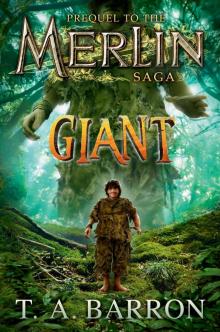 Giant
Giant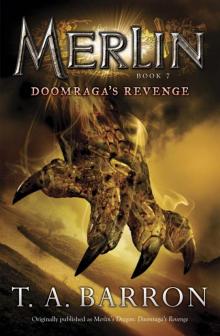 Doomraga's Revenge
Doomraga's Revenge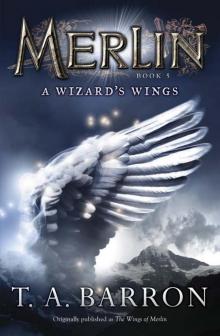 A Wizard's Wings
A Wizard's Wings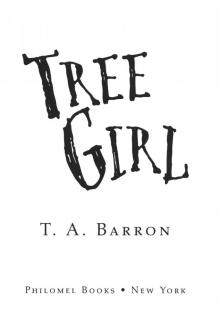 Tree Girl
Tree Girl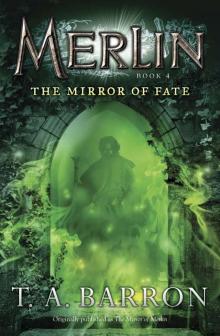 The Mirror of Fate
The Mirror of Fate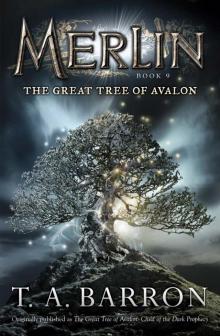 The Great Tree of Avalon
The Great Tree of Avalon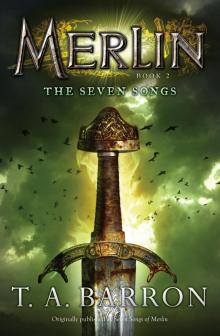 The Seven Songs
The Seven Songs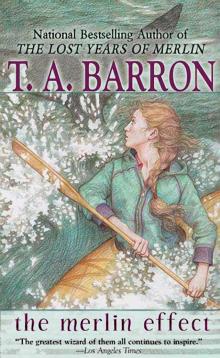 The Merlin Effect
The Merlin Effect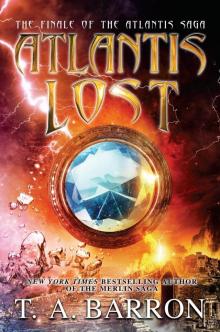 Atlantis Lost
Atlantis Lost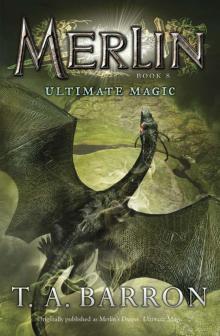 Ultimate Magic
Ultimate Magic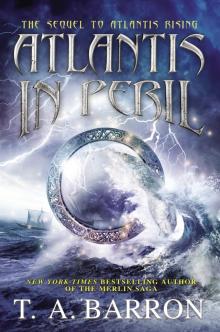 Atlantis in Peril
Atlantis in Peril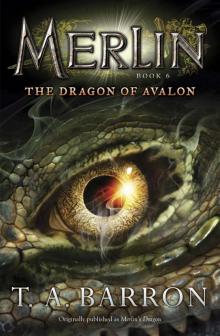 The Dragon of Avalon
The Dragon of Avalon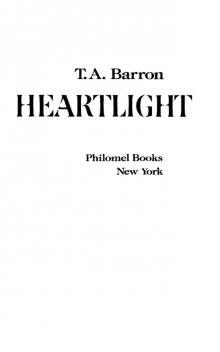 Heartlight
Heartlight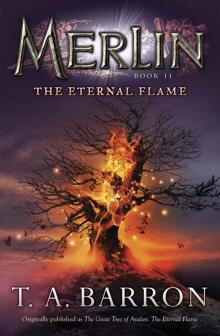 The Eternal Flame
The Eternal Flame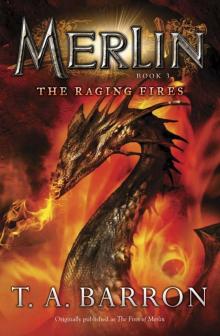 The Raging Fires
The Raging Fires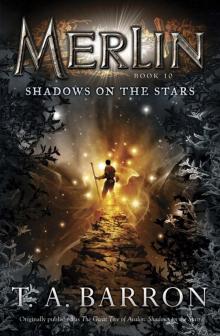 Shadows on the Stars
Shadows on the Stars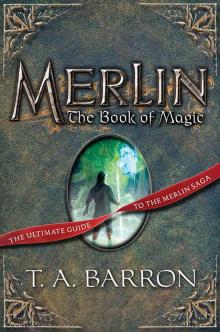 Merlin: The Book of Magic
Merlin: The Book of Magic The Lost Years
The Lost Years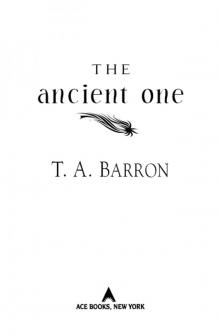 The Ancient One
The Ancient One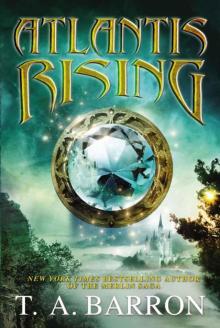 Atlantis Rising
Atlantis Rising